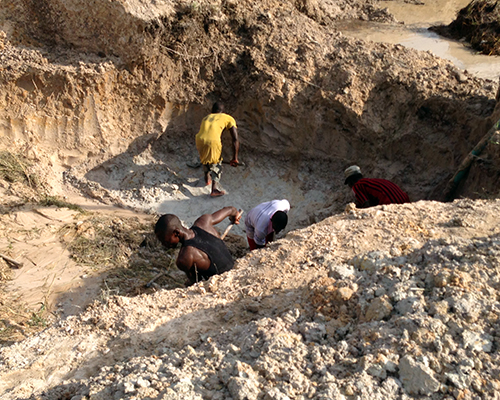Impact Evaluation of USAID’s Property Rights and Artisanal Diamond Development II in Guinea
Global Development

In Guinea, The Cloudburst Group has designed and is implementing a Difference-in-Difference impact evaluation for USAID’s Property Rights and Artisanal Diamond Development II (PRADD II) project. PRADD II was developed to strengthen the capacity of diamond-producing nations to comply with the Kimberley Process Certification Scheme. It seeks to strengthen internal control systems and increase the volume of rough diamonds that enter the legal supply chain. In addition, PRADD II aims to improve artisanal miners’ livelihoods and support vulnerable communities by strengthening the tenure security of both primary (landowners) rights and secondary (miners) rights, improving governance of surface and sub-surface resources, and promoting economic development.
The PRADD II impact evaluation assesses the project’s impact on strengthening surface and sub-surface property rights, enhancing livelihood outcomes, reducing land and natural resource conflict, and promoting environmental rehabilitation of artisanal mining sites. The impact evaluation will measure the impact of bundled interventions over a 5-year period between six artisanal mining treatment sites (in Forecariah prefecture) and six artisanal mining control sites (in Kindia prefecture) at the household and artisanal miner levels. The impact evaluation will test hypotheses related to project interventions and conflict; land expropriation; local capacity to negotiate with investors; enhanced control, monitoring and legality of diamond production; and improvements to environmental conditions, governance institutions, and welfare outcomes. Given the long period of time between baseline and endline surveys for this impact evaluation, The Cloudburst Group is adopting a triple differencing approach stratifying the survey among households that do and do not engage in artisanal mining. The Cloudburst Group designed four instruments to collect data: a large-N (~2,000) household survey (which will collect data from the primary female as well as male head of household); focus group discussions; key informant interviews with customary land owners and plantation owners; and a large N (~1,000) artisanal miners and masters’ survey. This evaluation also involves the collection of secondary and administrative data.
Due to the outbreak of Ebola in West Africa, international travel to Guinea was restricted. To minimize any health risk to the enumerators or communities involved in the research, The Cloudburst Group worked with the local data collectors, USAID, and the implementing partner to develop a contingency-based forward planning process during the baseline data collection. This transparent and collaborative risk management plan served to limit the potential for harm to community members being surveyed and interviewed and data collectors in the field.
Our external research partners in this Impact Evaluation are Mike McGovern, PhD, University of Michigan and Cynthia Caron, PhD, Clark University.
